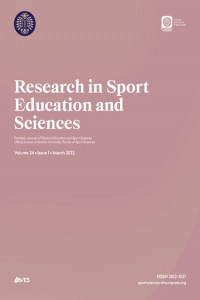GÜREŞÇİLERDE SPORTİF BAŞARIYI OLUMSUZ ETKİLEYEN FAKTÖRLERİN İNCELENMESİ
Spor, Güreş, Sportif Başarı
INVESTIGATION OF FACTORS AFFECTING SPORTIVE SUCCESS IN WRESTLERS
Sports, wrestling, sporting success,
___
- Bayraktar, C. (2003). Sosyal Yapı Özelliklerinin Spora Etkisi. Uludağ Üniversitesi Eğitim Fakültesi Dergisi, Cilt: XVII, Sayı: 1.
- Bernard, A.B., Busse, M.R. (2004). Who wins the olympic games: economic resources and medal totals. Review of Economics and Statistics, 86(1), 413-417.
- Büyüköztürk, Ş., Çakmak, E.K., Akgün ÖE., Karadeniz, Ş., Demirel, F. (2011). Bilimsel araştırma yöntemleri, Pegem yayıncılık, 8. baskı, Ankara.
- Carron, A.V., Bray, S.R., Eys, M.A. (2002). Team Cohesion And Team Succes in Sport, Journal of Sports Sciences: 20,119-126.
- Coakley, J. (1993). Social Dimensions of İntensive Training and Participation in Youth Sports, İntensive Participation in Children's Sports, Cahili, B. R. and Pearl, A. J. , Human Kinetics Publishers.
- De Bosscher, V., De Knop, P., Van Bottenburg, M., Shibli S. (2006). A conceptual framework for analysing sports policy factors leading to international sporting success. European Sport Management Quarterly, 6(2), 185-215.
- Erdem, K. (2005). Futbolda Kenar Yönetimi, Morpa Yayın Evi, S. 10, İstanbul.
- Erdoğan, N., Zekioğlu, A., Dorak, F. (2014). Hentbol Antrenörlerine Göre, Sporcuların Performansını Psikolojik Yönden Etkileyen Faktörler Nelerdir? Nitel Çalışma. International Journal of Science Culture and Sport. Special Issue .
- Feltz, D., Landers, D. M. (1983). “The effects of mental practice on motor skill learning performance: A meta analysis”, Journal of Sport Psychology, 5, pp. 25-27.
- Fişek, K. (1989). Spor Yönetimi, A.Ü.S.B.F. Yayın no: 445, Ankara, s. 84.
- Kale, R. (1994). Toplum ve Olimpik Başarı, Türkiye ve Olimpiyat Sempozyumu, İstanbul, 249.
- Kaynar, Ö. ve Bilici, M.F. (2017). Analysis of the Talent Selection in Turkish Wrestling. International Journal of Science Culture and Sport, 5(4):347-355.
- Kılcıgil, E. (1998). Sosyal Çevre-Spor İlişkileri, Teori ve Elit Sporculara İlişkin Bir Uygulama. Ankara: Bağırgan Yayınevi.
- Konter, E. (1998). Sporda Hazırlığın Teoriği ve Pratiği, Bağırgan Yayınevi, Ankara.
- Kuchler, W.J. (2008). “Perceived Leadership Behavior and Subordinates’ Job Satisfaction in Midwestern NCAA Division III Athletic Departments”, The Sport Journal, v.11,n.2.
- Mülazımoğlu, O. (2012). Genç Basketbolcularda Yorgunluğun Şut Tekniğine Etkisi. Selcuk University Journal of Physical Education and Sport Science, 14(1):37-41.
- Onağ, Z. G., Güzel, P., Özbey, S. (2013). "Futbol Antrenörlerinin Görüşlerine Göre, Takım Başarısını Etkileyen Faktörler: Nitel Bir Araştırma." Pamukkale Journal of Sport Sciences 4.2
- Özgüven, M. (1996). Topium Bilimlerine Giriş, Ekin Kitabevi, Bursa.
- Öztürk, F. (1998).Toplumsal Boyutlarıyla Spor, Bağırgan Yayımevi, Ankara, , s.61.
- Önçağ, Ö., Çoğulu, D. (2005) Ailenin Sosyo-Ekonomik Durumu ve Eğitim Düzeyinin Çocuklarda Dental Kaygı Üzerine Etkisi, A.Ü., Diş Hek. Fak. Dergisi, 32(1), 45-54.
- Pekel, H. A., Aydos, L., Onay, M. (2006) Türkiye’deki Elit Atletlerin Sosyo-Ekonomik Durumları Üzerine Bir Araştırma, Kastamonu Eğitim Dergisi,14, 2, 667-678.
- Prokop, L. (1983). Einführung in die sportmedizin für artze, sportler und übungsleiter. Stutgart: Fischer,.
- Ramzaninezhad, R., Keshtan, M.H. (2009). The Relationship Between Coach’s Leadership Styles And Team Cohesion In Iran Football Clubs Professional League, Brazilian of Journal of Biomotricity, 3(2): 11-120.
- Yılmaz, K. ve Altınkurt, Y. (2011). Göreve Yeni Başlayan Özel Dershane Öğretmenlerinin Kurumlarındaki Çalışma Koşullarına İlişkin Görüşleri. Kuram ve Uygulamada Eğitim Bilimleri, 11 (2), 635-650.
- Başlangıç: 2020
- Yayıncı: Atatürk Üniversitesi
BEDEN EĞİTİMİ VE SPOR ÖĞRETMENLİĞİ ÖĞRENCİLERİNİN TÜKENMİŞLİK DÜZEYLERİNİN DEĞERLENDİRİLMESİ
Ayşe Feray ÖZBAL, Tolga ESKİ, Arıkan EKTİRİCİ
ÖĞRETMEN ADAYLARININ MÜKEMMELİYETÇİLİK VE ÖFKE EĞİLİMLERİ ARASINDAKİ İLİŞKİNİN İNCELENMESİ
Ebru DEMİRCİ, Fatma ÇEPİKKURT, Esen KIZILDAĞ KALE, Ecem GÜLER
OKUL SPORLARINA KATILAN LİSE ÖĞRENCİLERİNİN ÖFKE DÜZEYLERİNİN BAZI DEĞİŞKENLER AÇISINDAN İNCELENMESİ
GÜREŞÇİLERDE SPORTİF BAŞARIYI OLUMSUZ ETKİLEYEN FAKTÖRLERİN İNCELENMESİ
Ömer KAYNAR, Sinan SEYHAN, M. Fatih BİLİCİ
SPOR KULÜPLERİNDE PERFORMANS YÖNETİMİ
ELİT TAEKWONDO VE POOMSE OYUNCULARININ FİZİKSEL VE FİZYOLOJİK PARAMETRELERİNİN İNCELENMESİ
Osman Şenel ÖZSOY, Serdar ELER, Nebahat ELER
Ebru ÇETİN, Neslihan ÖZCAN, Umut YILMAZ
POPÜLER KÜLTÜRDE REKREATİF BİR ETKİNLİK OLARAK DİJİTAL SPORLAR
Melike ESENTAŞ, Pınar GÜZEL, Mehmet VURAL
BASKETBOL İL TEMSİLCİLERİNİN ÖRGÜTSEL BAĞLILIK DÜZEYLERİNİN İNCELENMESİ
FUTBOLCULARDA BACAK KUVVETİ İLE AEROBİK VE ANAEROBİK KAPASİTE İLİŞKİSİ
Cansel ARSLANOĞLU, Kadir BAYNAZ, Kürşat ACAR, Ahmet MOR, Gökhan İPEKOĞLU, Erkan ARSLANOĞLU
